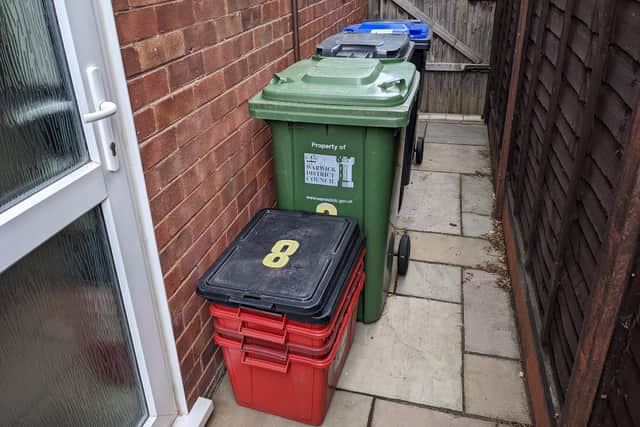‘Cost of living crisis is reason for less household waste in Warwickshire’
and live on Freeview channel 276
A reduction in the amount of waste collected across Warwickshire is a reflection of people tightening their belts.
That was the view of Warwickshire County Council’s waste management and partnerships group manager Andrew Pau during a meeting at which each area of the county was represented this week.
Advertisement
Hide AdAdvertisement
Hide AdThe county’s data shows that the overall volume of household waste dropped by more than 23,000 tonnes over the past financial year (2022-23), a reduction of nine per cent.


It led to a drop in the volume being recycled, composted and reused but the proportion of each of those amounts compared with the overall household waste figure improved across the board.
That meant more than 9,000 tonnes was shaved off the amount going to landfill with around 16,000 tonnes or 6.7 per cent of the overall waste compared with more than 25,000 tonnes – 9.7 per cent of the overall waste – in 2021-22.
Mr Pau told the Warwickshire Waste Partnership, a panel of councillors and waste managers from the county and five borough and district councils: “On one level I can say that is really good performance, it shows our waste minimisation initiatives are really biting.
Advertisement
Hide AdAdvertisement
Hide Ad“On the other hand, I think there were a lot of external factors that came to bear in the last financial year, not least the cost-of-living issues which meant people had less disposable income.
“In times of hardship, we say it is a reduction in waste because people are buying less. In waste management terms, that is good because less waste is better for the environment and better for us as a group of authorities.”
Councillor Tim Sinclair (Con, Stratford North) queried what evidence there was to show that “people are buying less stuff”.
Mr Pau said there was no scientific data but added: “I know someone mapped waste production to GDP (gross domestic product), looking at what happened in times of growth and times of hardship, and it was a very good proxy of the amount of waste produced.
Advertisement
Hide AdAdvertisement
Hide Ad“You can say that is anecdotal, I haven’t done a study on that and I don’t know if anyone else has done a proper study but we think that is one of the reasons behind the reduction in waste.”
Cllr Sinclair asked for it to be noted as an opinion rather than fact, adding: “Nine per cent is a very significant number and if it was because of actions (the councils have taken) then we should not ignore that.”
Mr Pau said: “It is a very significant number and we are going to have to log that because if we can retain some of that waste reduction into this and future years, that will be a real win for us as a group of authorities in terms of performance, cost as well as the environmental benefits of not having this kind of waste.”